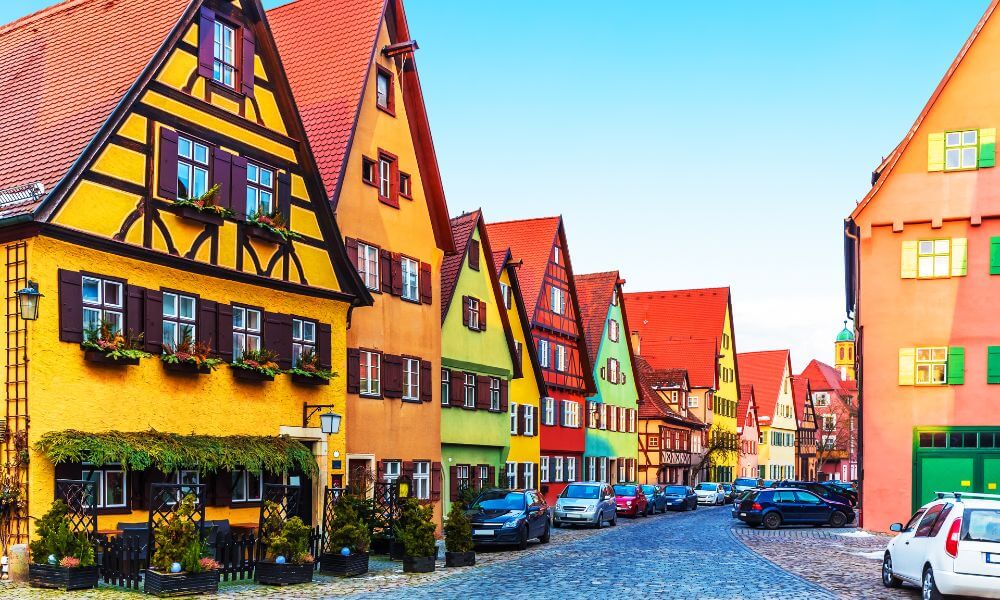German is the official language of German, and around 95% of the nation’s population speaks either standard German or a regional dialect of German. There are also many other regional tongues recognized as distinct languages in Germany, such as Low Rhenish, Bavarian, Alemannic, as well as a variety of foreign languages widely spoken like Danish and French.
The region of the world we now call Germany is relatively young as a nation compared to many of its neighbors.
As a result of this, many individual languages have developed which can be considered entirely distinct languages, rather than regional dialects of German.
Let’s find out more.

How many languages are spoken in Germany?
Quite a few different languages are spoken in Germany.
Naturally, the first and by far the most common language in Germany is German, or standard German.
Around 95% of the population speak German, most of them as a first language but many also speak it as their second language.
This figure, it should be noted, also includes some languages which are usually recognized as minority languages, such as Northern Low Saxon.
There are many such languages, but some are simply included as Standard German when it comes to statistics like these.
However, there are also many recognized languages that are not lumped in with German in this way.
In general, you can separate German languages into Low and High German.
One of the most commonly spoken in Germany is Low Rheinish, the German name for a regional Low Franconian varieties of language spoken in west Germany in the Lower Rhine.
Limburgish is also widely spoken in Germany.
The language naturally originates, and is most commonly spoken, in the Limburg province of Belgium and the Netherlands.
It is also widely spoken in the German regions that border Limburg, however, particularly the North Rhine-Westphalia.
Bavarian is part of the Upper German language family, with Alemannic and East Franconian.
Depending on the source you check, Bavarian may either be classified as a German dialect or a distinct language.
There’s naturally a lot of mutual intelligibility, but many think Bavarian is different enough to be its own language.
There are around 14,000,000 Bavarian speakers.
Germany elsewise is a linguistic melting pot; you have Upper and Lower Sorbian, North Frisian, Saterland Frisian, Luxembourgish, and a variety of foreign languages like French, Portuguese, Arabic, Albanian, Russian and many more.
How many languages are spoken in Germany depends on what your definition of a distinct language is—not everyone will agree and thus estimates will vary quite wildly!
What are the main languages of Germany?

The main language of Germany is, unsurprisingly, German.
This is the main language of 95% of the population, and the most common language you can expect to converse with in any major city or town.
As mentioned, it is the primary language of 95% of the population, and the one used in all official capacities like government, courts, schools and the press.
Most of those who live in a regional are where a different dialect is prevalent will still be able to understand Standard German just fine.
Most of the minority languages are tiny by comparison.
Sorbian is among the most widely spoken minority language, though it only represents around 0.09% of the population.
North Frisian is another of the most common, and that is only spoken by around 0.01% of the population.
Romani is also an important minority language in Germany.
There is a large Romani population in Germany, and Romani speakers represent around 0.8% of the population.
Romani communities are very common in central Europe, and theirs is an officially recognized minority language in Germany.
German speakers are proficient in second languages, though.
Many speak English, French, Dutch and Danish.
Is English widely spoken in Germany?

English is widely spoken in Germany, though you shouldn’t go in expecting to be understood in English by everyone.
Like in many countries, English is used in Germany as the language of international trade, business, and often of political relations.
German speakers tend to have better exposure to learning English as a second language, and thus it is relatively common for German speakers to also speak English.
Given Germany’s own neighbors, though, like the Netherlands, France, and Poland, there are many other languages that may take priority over learning English—so don’t rely on the average German being able to speak English with you!
Is it hard to learn German?
German is widely considered quite a difficult language to learn.
It has many cases and the sentence structure is completely different to English, making it quite challenging.
It is in the same family as English which means there is a lot of shared vocabulary and similarities, but learning any language is a difficult task—and German doesn’t make it any easier.
While learning German is probably easier, for example, than learning Mandarin or Japanese, it’s still not going to be a walk in the park.
It’s going to take time and patience, no matter how good you are at learning languages.
A great way to learn German, would be to buy a course.
If you are serious and would like to learn German, Rocket Languages do a great course with a free trial.
There are many regional languages in Germany, then, and not all of them can be classified simply as dialects of German.
Though the vast majority of the population speak German, whether as a first or second language, there are many languages housed in Germany that you won’t find anywhere else in the world.
Other than that, Germany is highly multicultural and linguistically diverse in terms of the immigrant and foreign languages spoken there.
More in Regional Languages
- What Languages Are Spoken In Afghanistan?
- What Languages Are Spoken In Africa?
- What Languages Are Spoken In Albania?
- What Languages Are Spoken In America?
- What Languages Are Spoken In Antwerp?
- What Languages Are Spoken In Argentina?
- What Languages Are Spoken In Australia?
- What Languages Are Spoken In Austria?
- What Languages Are Spoken In Bangladesh?
- What Languages Are Spoken In Barcelona?
- What Languages Are Spoken In Belgium?
- What Languages Are Spoken In Bolivia?
- What Languages Are Spoken In Bosnia?
- What Languages Are Spoken In Brazil?
- What Languages Are Spoken In Budapest?
- What Languages Are Spoken In China?
- What Languages Are Spoken In Colombia?
- What Languages Are Spoken In Croatia?
- What Languages Are Spoken In Cuba?
- What Languages Are Spoken In Cyprus?
- What Languages Are Spoken In Denmark?
- What Languages Are Spoken In Djibouti?
- What Languages Are Spoken In Ecuador?
- What Languages Are Spoken In Egypt?
- What Languages Are Spoken In El Salvador?
- What Languages Are Spoken In England?
- What Languages Are Spoken In Eritrea?
- What Languages Are Spoken In Estonia?
- What Languages Are Spoken In Ethiopia?
- What Languages Are Spoken In Fiji?
- What Languages Are Spoken In Finland?
- What Languages Are Spoken In Germany?
- What Languages Are Spoken In Japan?
- What Languages Are Spoken In Morocco?
- What Languages Are Spoken In South Africa?

